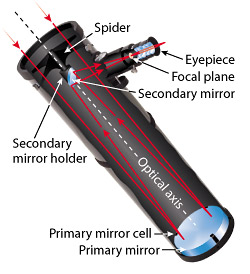
Should you set your digital camera to a low or high ISO value in twilight?
When I’m shooting a planetary grouping in twilight, should I set my digital camera to a low or a high ISO value? The easiest way to answer this question is to make test exposures of a skyline during twilight, with or without planets. Try all the available ISO values (analogous…
How is the date of Easter determined?
How is the date of Easter determined? The rule most people remember is that Easter falls on the first Sunday after the first full Moon following the March equinox. In practice, Roman Catholic and Protestant churches follow a method of calculation adopted with the Gregorian calendar reform of 1582. The…

How will you know when you telescope mirrors need re-aluminizing?
I have read that telescope mirrors require periodic re-aluminizing. How will I know when mine needs this? While it’s true that the aluminized surface of a telescope mirror will deteriorate over time, there is no hard and fast rule about how long this will take. Some coatings last only a…

How did early astronomers calculate accurate solar system positions?
In the pre-computer age, say 50 years ago and back, how did astronomers calculate accurate positions of the Sun, Moon, and planets for predicting an eclipse or a transit of Venus? They did it by hand, with the help of numerical tables. These weren’t the trigonometric and logarithmic tables you…

How can an astrophoto shot through a refractor have diffraction spikes on bright stars?
In your Gallery department (S&TSeptember 2004, page 144), you had a nice image of the star Pollux showing diffraction spikes. That suggests it was taken with a Newtonian reflector, but the accompanying note says a Takahashi refractor was used. Where did the spikes come from? Many imaging enthusiasts like the…

What should I do if my telescope mirror is dusty?
I took my new scope out last night and pointed a flashlight down the tube. My mirror looks really dusty. What should I do? The answer is simple: Don’t shine a light down the tube at night! Seriously, it only makes the dust look a lot worse than it is.…

How Can I Prevent My Finder From Dewing Over?
How do I keep my finder from dewing over when I observe? Your finder should have a light shield (“dewcap”), which you can cover between uses. Or you can purchase an anti-dewing device. This need not be expensive. You probably have a box full of them at home: A simple…

Could you see astronauts on the Moon?
If there were astronauts on the Moon, could we see them? I get some variant of this question almost every time I show someone his or her first view of the Moon through a telescope, especially at high magnification. The breathtaking sight of lunar craters, mountains, and other features down…

Should I wear eyeglasses while observing?
Should I wear eyeglasses while observing? If you are near-or farsighted, with no other eye problems, definitely take them off. You’ll have to tweak the focus, but you’ll see objects in the telescope just as clearly as if you had 20:20 vision. By taking off your glasses you’ll avoid the…

What’s the difference between nebula filters and light-pollution filters?
What’s the difference between nebula filters and light-pollution filters? Nebula filters block out most of the visible spectrum while transmitting the handful of finely tuned colors that emanate from the most luminous constituents of cosmic gas clouds: hydrogen atoms and oxygen ions. Light-pollution filters, by contrast, are designed to block…

How can I get my German equatorial mount to hold its tilt?
My old German equatorial mount won't hold the proper tilt for my latitude. What can I do? Believe it or not, grease the threads and washer of the large bolt that clamps the polar-axis housing to the tripod head. Then tighten it. — Dennis di Cicco

What's the difference between two Plössl eyepieces?
I bought exactly the same Plössl eyepiece that a buddy has, but mine doesn’t work as well as his. Did I get a lemon? That’s possible, but very unlikely. Our guess is that your telescope has a short focal ratio, perhaps f/5 or less, while your friend may have an…

Is software available to analyze optical designs of telescopes?
Does software exist, preferably downloadable from the Internet, that I can use to analyze original optical designs of telescopes? Yes. The easiest way to find what’s out there is with a fine-tuned Google search. Right now, if you enter “optical design software” as the search terms, you get a few…

What size first telescope mirror should I make?
What size is best for someone’s first attempt at making a telescope mirror? Most books on telescope making recommend starting with either a 6- or an 8-inch mirror, and that’s good advice. Either size is suitable for a first-timer, but a 6-inch will probably take a little less time to…

How can eyepieces offer a telescope's widest true field?
Some eyepieces are being advertised as offering the widest possible true field in any telescope. How is this determined? The amount of sky shown by an eyepiece is governed by the diameter of its field stop, the ring that defines the edge of the visible field. On a given telescope,…

How can I polar align in the daytime?
I want to see a planetary transit. How can I polar align my telescope in the daytime? One good way is to use the Sun. Carefully level your mount with a bubble level and set the polar axis to the latitude of your site. Hang a weighted string from the…
How do I clean eyepiece lenses?
Very carefully — and not often! Here are some tips to help you keep your optics clean.
